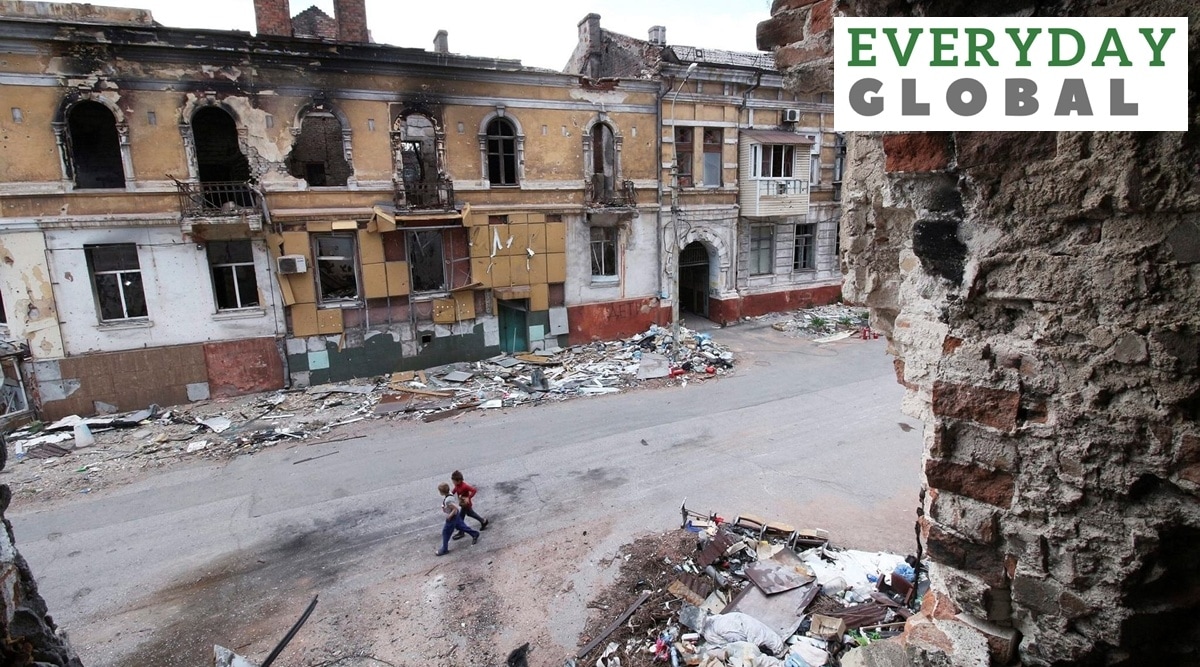Latest Comment
Post Comment
Read Comments
 Children walk among buildings destroyed during fighting in Mariupol, in territory under the government of the Donetsk People's Republic, eastern Ukraine. (AP/PTI)
Children walk among buildings destroyed during fighting in Mariupol, in territory under the government of the Donetsk People's Republic, eastern Ukraine. (AP/PTI)Ukranian authorities on Tuesday (May 24) accused two soldiers from Belarus of torturing and killing civilians in Motyzhyn village near Kyiv. Allegedly belonging to the ‘Wagner Group’, these are the first international mercenaries to be accused of war crimes in Ukraine, according to a report by The Guardian.
Buy Now | Our best subscription plan now has a special price
The group
Since the beginning of Russia’s invasion of Ukraine in late February, news reports have indicated the presence of a mercenary group in the country. Although known popularly as the Wagner Group, there is no corporation registered under that name, no recruitment centre, and no records about where its funding comes from. According to reports in The Washington Post, it is a network of contractors that supply soldiers for hire.
The Wagner Group first surfaced in 2014, during Russia’s annexation of Crimea. There have been reports of its presence in the Middle East and Africa as well.
There are allegations, denied by the Kremlin, that Wagner Group shares close ties with President Validimir Putin. While the Kremlin stresses mercenary forces are illegal in Russia, observers have argued that the Wagner Group is helpful to Russia’s war effort, as it can send these forces to Ukraine while simultaneously denying any relationship with them. Sorcha MacLeod, chair of the United Nations Working Group on the use of mercenaries, told The New York Times that the lack of transparency allows the country to have plausible deniability and helps form a “distance between the Russian state and the group”.
The group is said to have been founded by Dmitry Utkin, a former special forces officer, member of Russia’s military intelligence service and a veteran of both Chechen wars. Some claim that the Wagner Group got its name from Utkin’s call sign, Vagner. According to another theory, he named his group in honour of Adolf Hitler’s favourite composer, Richard Wagner.
Putin’s ‘chef’
The European Union and US Treasury Department have claimed that the Wagner Group is bankrolled by the Russian oligarch and close ally of Putin, Yevgeniy Prigozhin, who has repeatedly denied these allegations.
Beginning his career as a hot dog vendor, Prigozhin rose to be a restaurateur and served the Russian elite. He earned the nickname ‘Putin’s Chef’ after winning a number of catering contracts for state banquets. The US Treasury has also accused Prigozhin of financing the Internet Research Agency, a “troll farm” that was to have influenced the 2016 presidential elections in the US through disinformation campaigns by fake social media accounts. In April, the European Union imposed sanctions on Prigozhin and stated that as the “founder and unofficial head of the Wagner Group”, he was “responsible for the deployment of Wagner Group mercenaries in Ukraine”.
Presence in Ukraine
The Wagner Group is said to have trained and armed Russian-backed forces that were attempting to take over Ukraine’s Donbas region in 2014. It is also said to have aided Russian forces during the annexation of Crimea.
Since Russia’s invasion of Ukraine, there have been an estimated 1,000 Wagner Group mercenaries stationed in Ukraine, according to a report in The Washington Post in April. Also in April, The Financial Times reported that Russia had moved some 200 soldiers of the Wagner Group to Ukraine from Libya.
With an estimated 190,000 Russian soldiers deployed in Ukraine, it is not yet completely clear what function the Wagner Group is supposed to perform. Candace Rondeaux, director of the Future Frontlines programme at New America, told The Intercept that one purpose they serve is to “create the impression that Russia can project itself militarily anywhere in the world.”
Fighters from the Wagner Group have also been accused by Ukrainian officials of committing war crimes since the takeover of the Donbas region in 2014. The Guardian reported on May 25 that at least two Wagner fighters have been suspected of murdering civilians in Ukraine.
Presence elsewhere
Wagner Group forces have also been deployed in Syria, Libya, Central African Republic, Mali, Sudan and Mozambique, The New York Times reported.
In Syria, the Wagner Group fought alongside Russian forces and the backed Bashar al-Assad regime. They aided in the seizure of oil and gas fields and secured government infrastructure, the Wall Street Journal reported.
Newsletter | Click to get the day’s best explainers in your inbox
After France decided to withdraw thousands of troops from Mali last year, authorities turned to Russia and the Wagner Group to help aid in the battle against insurgents. According to The Washington Post, 800-1,000 Russian mercenaries are stationed in Mali, costing the government $10 million each month. A report in The Guardian said that in March, the Wagner Group was suspected to have been involved in a massacre in Moura (Mali), where 350-380 men were killed.
In May, Human Rights Watch reported that Russian and Wagner Group forces “appear to have summarily executed, tortured, and beaten civilians since 2019” in Central African Republic.